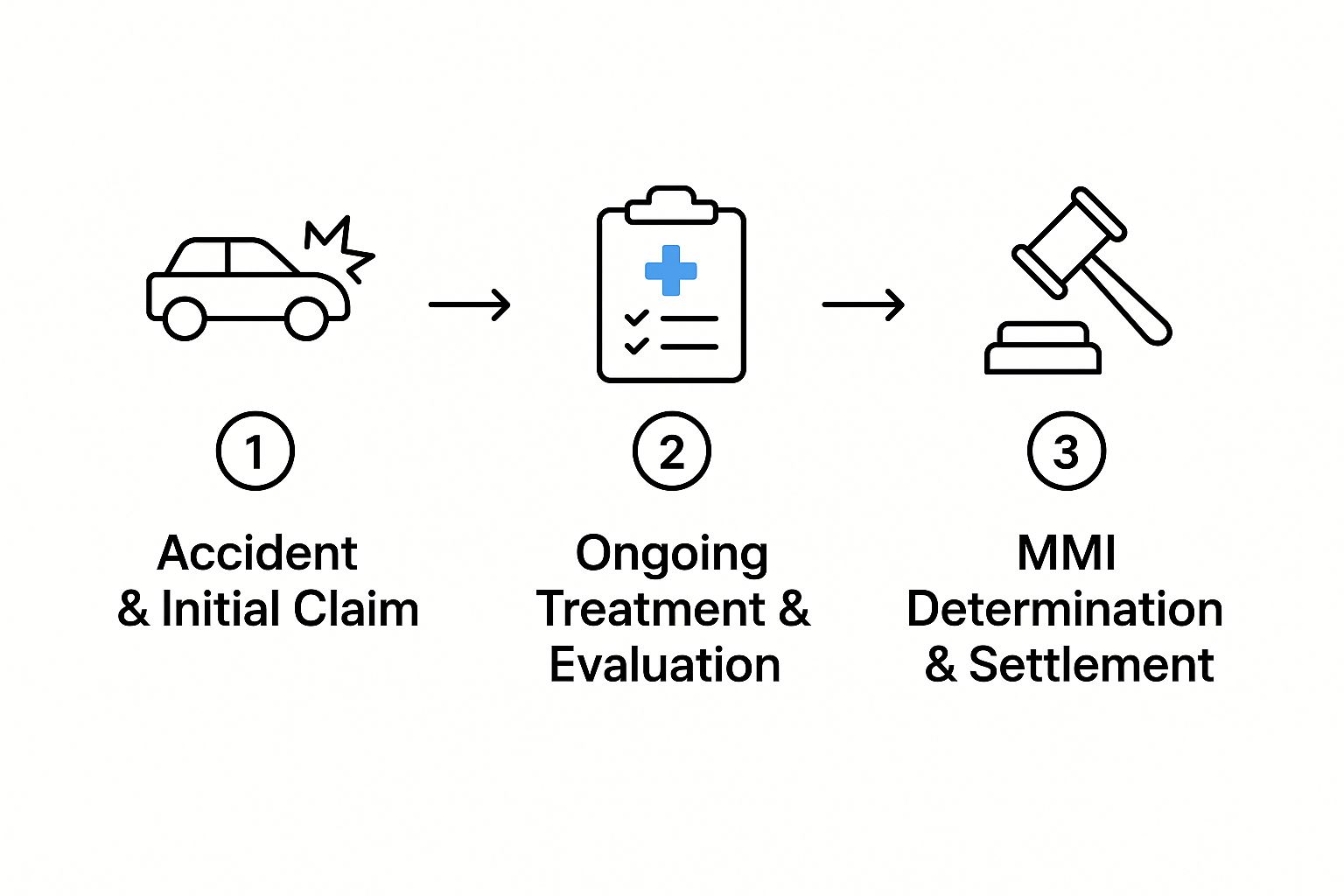What Is MMI in Workers Comp and What It Means for You
"I was satisfied once John Bell took over my case."
"Communication was always timely."
What Is MMI in Workers Comp and What It Means for You
If you've heard the term Maximum Medical Improvement, or MMI, you're likely at a critical crossroads in your workers' compensation case. Think of it as reaching a 'healing plateau'—it's the point where your doctor has determined that your condition has stabilized and isn't expected to improve much further, at least with standard medical treatments.
Understanding this milestone is absolutely crucial for your benefits and your future.
What Maximum Medical Improvement Means for Your Claim

Maximum Medical Improvement (MMI) is a formal term, both medical and legal, that signals a major shift in a workers' comp claim. In simple terms, it marks the end of the active healing and recovery phase. This has a direct impact on the kind of benefits you're eligible to receive from that point on.
It’s just as important to understand what MMI is not. It doesn't mean you're fully healed or back to 100%. It certainly doesn't mean you're free of pain or physical limitations. Many injured workers reach MMI but are left with permanent restrictions or need ongoing medical care just to manage their symptoms.
Reaching MMI is the medical system's way of saying your condition, whether it's a back injury or a repetitive stress disorder, has become as good as it's going to get with standard curative treatments.
To help you quickly grasp the main ideas, here’s a simple table breaking down the core concepts of MMI.
MMI at a Glance: Key Concepts
| Healing Plateau | Your recovery has stabilized. The focus now shifts from "getting better" to managing a long-term condition. |
| End of Temporary Benefits | Temporary disability payments, which replace your wages while you heal, will stop once you are declared at MMI. |
| Permanent Disability Evaluation | This is the next step. Your doctor assesses any lasting effects of your injury to determine a Permanent Impairment Rating (PIR). |
| Shift in Medical Care | Medical treatment may change from trying to cure the injury to focusing on long-term management of pain or physical limitations. |
This table provides a snapshot, but understanding these points is key to navigating the next phase of your claim effectively.
Key Effects of an MMI Determination
The concept of MMI is built on a few core principles that guide how your claim proceeds. It’s a critical milestone because it represents the point where your medical condition is unlikely to improve further. This determination, usually made by your treating physician, serves several key functions that change the entire direction of your case. For more details, you can explore MMI insights from legal experts.
Here’s what happens when you reach MMI:
- It stops temporary disability benefits: These payments are meant to replace lost wages while you are actively recovering. Since MMI signals the end of that recovery period, these benefits typically cease.
- It triggers a permanent disability evaluation: Once you're at MMI, your doctor's next job is to assess any lasting limitations. This evaluation results in what's called a Permanent Impairment Rating (PIR), a crucial number for your final settlement.
- It shifts the focus to long-term care: The goal of your medical treatment may change. Instead of trying to cure the injury, the focus often moves to managing chronic symptoms, such as pain or reduced mobility, through palliative care.
Ultimately, MMI is the official marker that transitions your claim from temporary support to a final resolution based on the permanent, long-term effects of your work injury.
How Doctors Determine You Have Reached MMI
Figuring out when you've hit Maximum Medical Improvement isn't just a hunch; it's a specific medical judgment call made by your treating doctor. They're looking for the point where your recovery has essentially flattened out.
Think of it this way: your condition has stabilized. Any further medical treatment isn't about healing you more, but rather about managing symptoms and maintaining your current level of function. Your progress has hit a plateau, and significant improvement from here on out is unlikely.
This is a pivotal moment in any workers' comp claim, marking the shift from active treatment to long-term resolution.

As the infographic illustrates, the MMI determination is the critical turning point that moves a claim out of the healing phase and into the final settlement process.
The Role of Medical Examinations
Your own doctor is usually the one to make the initial MMI call, but their opinion isn't always the last word. The insurance company might push back, especially if they think more recovery is possible or that the treatment has gone on too long. When this happens, they'll often request an Independent Medical Examination (IME).
An IME is exactly what it sounds like: a medical review by a doctor chosen by the insurance carrier, not by you or your physician. Their job is to provide a second opinion on your condition. This doctor will go over your entire medical history, conduct a physical exam, and then write a report on whether they agree you've reached MMI.
The IME report can go one of two ways. It can either support your doctor’s findings and keep your claim moving forward, or it can create a major roadblock. A disagreement between the doctors can bring everything to a halt.
This examination is a standard part of the process, but its outcome is incredibly important. A dispute can directly impact your benefits, because the MMI designation is what typically ends temporary disability payments and kicks off the process for determining a permanent disability rating. You can learn more about how MMI impacts your benefits and see why this step is so crucial.
How MMI Directly Affects Your Workers' Comp Benefits

Getting that Maximum Medical Improvement diagnosis is a major turning point in your workers' comp case. It's the moment when the entire focus of your benefits shifts.
Think of your Temporary Disability (TD) payments as a bridge. They were there to replace your lost wages while you were actively recovering from your injury. But once your doctor says you've reached MMI, you've essentially crossed that bridge. The recovery phase is considered over, and those temporary wage-replacement checks stop. This can be a jarring financial change, but it's a standard part of the process.
From Temporary Payments to a Permanent Plan
The end of temporary benefits might feel abrupt, but it signals the start of the next critical stage: figuring out long-term compensation. Your claim now pivots to one central question: what permanent limitations did the injury leave you with, and how should you be compensated for them?
This is where the system evaluates the lasting impact of your injury on your ability to work and earn a living. It’s a transition from short-term support to a long-term resolution.
State laws are very clear on this. For instance, under the Pennsylvania Workers' Compensation Act, an MMI determination gives the insurance company the green light to modify or terminate temporary disability payments. This isn't just a suggestion; it's a fundamental trigger built into the legal framework that moves your case forward.
What Kind of Benefits Come After MMI?
With temporary payments off the table, the focus turns to benefits designed to address permanent injuries. This isn't a one-size-fits-all situation; the type of benefit depends entirely on the severity of your long-term limitations.
Here’s what usually happens next:
- Permanent Partial Disability (PPD): This is the most common outcome. You receive PPD benefits if your injury left you with a permanent impairment, but you can still work in some capacity. It compensates you for the loss of function or the limitations you now have.
- Permanent Total Disability (PTD): This is reserved for the most serious injuries. If your condition prevents you from returning to any type of sustainable, gainful employment, you may be eligible for PTD benefits.
- Ongoing Medical Care: Reaching MMI doesn't mean your medical treatment ends. You are often still entitled to future medical care needed to manage your condition, like pain management, physical therapy, or prescriptions.
Figuring out which benefits you qualify for can feel like navigating a maze. Understanding your fundamental eligibility for workers' compensation is the first step in protecting your rights throughout this entire process.
Decoding Your Permanent Impairment Rating

Once your doctor determines you've hit Maximum Medical Improvement (MMI), the focus shifts to figuring out what long-term effects the injury will have. This is where the Permanent Impairment Rating (PIR) comes in. It's a percentage that puts a number on the permanent damage or functional loss you’ve sustained.
Think of it less like a pain score and more like a medical measurement. The PIR isn't about your ability to do a certain job; it’s about how an injured body part functions now compared to how it did before you got hurt. This rating is the bedrock for calculating any final settlement or disability benefits.
How Is the Rating Calculated?
To get this number, a doctor—either your own treating physician or a qualified medical examiner—will conduct a thorough evaluation. They're looking for any lasting limitations, like a permanently reduced range of motion in your shoulder or lingering nerve damage in your hand.
Doctors don't just pull this percentage out of thin air. To keep things consistent and fair, they follow strict guidelines. Most states, including Oregon, use the official standards published by the American Medical Association (AMA).
- Example 1: Let's say you had knee surgery and can't bend your leg as far as you used to. A doctor might assign a 15% impairment rating to that leg.
- Example 2: An employee who suffers permanent hearing loss in one ear from job-site noise might get a 5% whole-person impairment rating.
This rating is a clinical assessment grounded in objective medical criteria.
A Permanent Impairment Rating is the key that unlocks your final benefits. A higher rating generally leads to a larger settlement, which is why it's so important that the evaluation is performed accurately and fairly.
From Rating to a Monetary Award
So, how does that percentage turn into actual dollars? Every state has its own unique formula to make this conversion. Typically, the calculation involves multiplying your impairment rating by a predetermined number of weeks and your average weekly wage.
A 15% knee impairment rating doesn't just stay a number on a form. It gets plugged into the state's workers' comp formula to calculate a specific monetary award. This payment is meant to compensate you for the permanent functional loss you'll carry for the rest of your life. Grasping how this works is a critical step toward ensuring you get the full compensation you’re entitled to.
Navigating Your Claim After Reaching MMI
Once your doctor says you’ve reached Maximum Medical Improvement (MMI), you've arrived at a critical juncture in your workers' compensation case. Think of it not as the end of the road, but as a major fork in it. This is where the long-term resolution of your claim begins to take shape, and the next steps depend entirely on your recovery and any permanent limitations left by the injury.
The main goal is always to get you back to work, but your injury might permanently change what "work" looks like for you. Now, you and your support team need to figure out how you move forward.
Defining Your Path Forward
After hitting MMI, what happens next? Generally, you’ll head down one of a few common paths. The right one for you hinges on the severity of your permanent medical restrictions and the kind of job you had before you got hurt.
Here are the most likely scenarios:
- Return to Your Previous Job: This is the best-case scenario. If the injury left you with no permanent restrictions, your doctor will likely clear you to return to your old role without any limitations.
- Return with Modifications: If you have new physical limits, your employer might be able to accommodate them. This could mean returning to your same job with some changes or moving to a different, less demanding position (often called light-duty work).
- Vocational Rehabilitation: What if you can't go back to your old employer at all? You might qualify for services to help you retrain for a new career that fits within your new physical abilities.
- Negotiate a Final Settlement: This path involves closing out your claim for a lump-sum payment. The settlement amount is designed to cover your permanent impairment and any future medical care you might need.
What if You Disagree with the MMI Report?
It's a common situation: the doctor says you're at MMI, but you know you're still recovering. Or maybe the impairment rating they assigned feels far too low and doesn't capture the reality of your daily struggles. You don't have to just accept a medical opinion that you feel is wrong.
Workers have the right to challenge an MMI determination. Doing so is crucial because a premature or inaccurate report can lead to your benefits being cut off too soon, leaving you with inadequate compensation. You can find more details about how MMI conclusions impact your benefits at pahurtatwork.com.
Never assume the first MMI opinion is the final word. If your condition is still improving or your rating seems wrong, seeking a second opinion is a critical step to protect your rights.
Challenging an MMI finding can be a complicated legal process. It usually involves filing a formal dispute, collecting additional medical evidence, and sometimes getting an evaluation from a different doctor. This is where having an experienced workers' compensation attorney becomes invaluable. A lawyer can guide you through the appeals process and fight to make sure you get the benefits you are truly owed, especially when navigating the official workers' compensation claim acceptance procedures.
Your Top Questions About MMI Answered
When you're dealing with a work injury, legal and medical terms like "MMI" can feel overwhelming. Let's clear up the confusion. Here are straightforward answers to the questions we hear most often from injured workers about reaching Maximum Medical Improvement.
Think of this as your practical guide to understanding what this critical stage really means for your claim.
Does Reaching MMI Mean I Am Fully Healed?
No, and this is probably the single biggest misunderstanding about MMI. Reaching Maximum Medical Improvement doesn't mean you're cured or back to 100%. It means your condition has plateaued.
You can absolutely still have chronic pain, lasting physical limitations, or need ongoing care to get through your day. MMI simply signals that, in your doctor's opinion, further "curative" treatment isn't expected to make you any better. It’s the end of the active healing phase.
Will My Workers' Comp Benefits Stop Completely After MMI?
Your temporary disability checks—the ones that replaced your wages while you were out of work healing—will usually end once you reach MMI. But that is definitely not the end of the story.
This is the point where the focus shifts to permanent disability benefits. These are meant to compensate you for the long-term impact of your injury on your ability to work and live. Depending on your state's laws, you might also be entitled to ongoing medical care for the injury, sometimes for a set period or even for life. You can learn more about what workers' compensation benefits you may be entitled to.
Reaching MMI is a transition, not a termination. Your benefits shift from temporary wage loss support to compensation for permanent functional loss and long-term medical needs.
What Should I Do If I Disagree With My MMI Diagnosis?
You have every right to challenge an MMI report or an impairment rating that you feel is wrong. If the doctor’s assessment doesn't match your day-to-day reality, you don't have to just accept it.
The most critical first step is to get in touch with a workers' compensation lawyer right away. They know the system and can help you navigate the process, which often involves:
- Getting a second opinion from another qualified physician.
- Formally disputing the insurance company's decision.
- Building a strong case with the right evidence to make sure you're treated fairly.
Can I Still Receive Medical Treatment After MMI?
Yes, you often can. An MMI status doesn't mean all medical care gets cut off. While treatments aimed at curing the injury might stop, you can frequently continue to receive palliative care.
Palliative care is all about managing symptoms and relieving pain from a permanent condition to help you maintain a better quality of life. This could look like ongoing physical therapy, pain medication management, or injections.
If you're navigating the complexities of a workers' compensation claim in Oregon, you don't have to do it alone. The experienced attorneys at Bell Law are here to protect your rights and ensure you receive the full benefits you deserve. Contact us today for a consultation at https://www.belllawoffices.com.
Disclaimer: The information on this page is provided for general informational purposes only and is not legal advice. Reading this content does not create an attorney-client relationship. For advice about your specific situation, please contact a licensed attorney.







